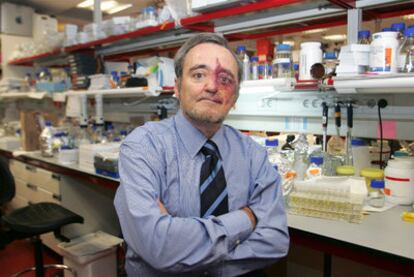Cancer scientist rages at government in funding row
Mariano Barbacid says red tape is stopping him from developing a possible cure for lung cancer
As one of the country's leading oncology researchers, Mariano Barbacid has always bemoaned the lack of financing for cancer research. So when the government recently prevented private funding for one of his projects - which could open a new battle front in the fight against lung cancer - Barbacid went on the attack.
He called the media to alert them to the Spanish government's decision to cancel an important experimental program at the National Center for Cancer Research (CNIO), including the work it was undertaking in the hope of developing advanced lung cancer treatments.
At the CNIO, where Barbacid serves as director, scientists have been studying a protein in rats called c-RAF to determine how it could be targeted in the development of new medicines to treat lung cancer. Barbacid, 61, and his team found the c-RAF protein, which is crucial for all malignant tumors, is very common in lung cancer, which makes up a fourth of all human cancers. Conversely, rats without the c-RAF protein were protected from developing this type of cancer.
The CNIO team was looking for ways to deactivate the protein through treatments or genetic manipulation.
The search through thousands of ways to attack one sole protein is usually the work that the big pharmaceuticals tackle, but the CNIO was doing this research through its experimental treatment program, which for the past five years has been financed with public money. The program has been successful; through it, scientists have been able to propose options for treatments of other types of cancer.
However, at the end of last year, the Science and Research Ministry told Barbacid that it was no longer funding the program, forcing him to cancel his studies into c-RAF protein. The ministry also told him it would not allow the private funding he had been seeking to continue the study.
"The ministry won't allow 10 million eurosin private funding because of a legal opinion that states no public foundation can establish agreements that would involve a business relationship," Barbacid said.
"It is ironic," he continues, "that these are the same government rules that are preventing an innovative approach, such as this one, even if it isn't costing the state anything. And then we complain when there isn't any private participation in research and development. It doesn't make sense; this has got to change." Ministry officials called Barbacid's comments "unfortunate," and said there is room for negotiation to look at other ways to allow private funding. The problem, they say, is that the formula used by Barbacid is "illegal," as was concluded in opinions drafted by the Solicitor General's Office and the private law firm Garrigues.
It has been 13 years since the Madrid native returned to work in Spain. Since then, Barbacid has criticized the country's contribution to scientific research, saying that investment in the field continues to be "well below" that of the rest of Europe and the United States. It is a frustrating situation for a globally respected cancer researcher, who after 23 years of living in the United States returned home to start a research center with the experience he had obtained working at the National Cancer Institute in Frederick, Maryland, and Bristol Myers-Squibb Pharmaceutical Research Institute in Princeton, New Jersey.
"I wanted to start a new cancer research institute, but under a fresh administrative umbrella and according to a research model that would encompass the advantages of the US system while accommodating the idiosyncrasies of the Spanish scientific community," Barbacid wrote in the scientific journal Cancer Cell in 2007.
Working as a fellow as the National Cancer Institute in Bethesda, Maryland soon after obtaining his PhD from Madrid's Complutense University, Barbacid began studying the molecular biology of human tumors and his work helped lead to the isolation of the first oncogene H-Ras in 1982.
Barbacid has published hundreds of journals, research papers and articles. A self-confessed workaholic, Barbacid brought back to Spain with him US-style work ethics as well as the grueling daily schedule his research demands. In 1998, he told EL PAÍS he didn't believe in taking vacations; in fact he believes his fellow Spaniards waste too much time on holiday.

Tu suscripción se está usando en otro dispositivo
¿Quieres añadir otro usuario a tu suscripción?
Si continúas leyendo en este dispositivo, no se podrá leer en el otro.
FlechaTu suscripción se está usando en otro dispositivo y solo puedes acceder a EL PAÍS desde un dispositivo a la vez.
Si quieres compartir tu cuenta, cambia tu suscripción a la modalidad Premium, así podrás añadir otro usuario. Cada uno accederá con su propia cuenta de email, lo que os permitirá personalizar vuestra experiencia en EL PAÍS.
¿Tienes una suscripción de empresa? Accede aquí para contratar más cuentas.
En el caso de no saber quién está usando tu cuenta, te recomendamos cambiar tu contraseña aquí.
Si decides continuar compartiendo tu cuenta, este mensaje se mostrará en tu dispositivo y en el de la otra persona que está usando tu cuenta de forma indefinida, afectando a tu experiencia de lectura. Puedes consultar aquí los términos y condiciones de la suscripción digital.








































